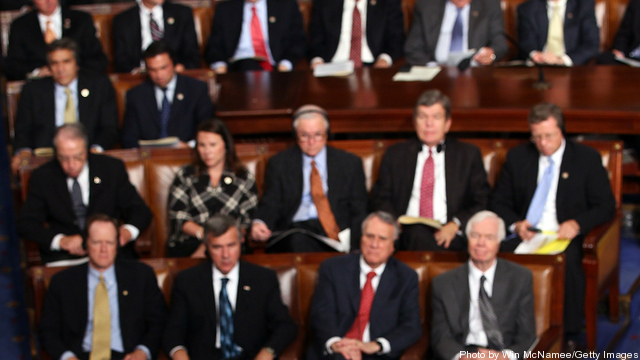The potential for water scarcity touches several segments of the energy sector, from hydraulic fracturing to hydropower to power plant cooling to growing algae or crops for biofuels. As water needs from the sector rise, this raises the question of how water use in energy should be regulated. Commentators with expertise in various aspects of… Keep reading →
Biofuels
Sign up and get Breaking Energy news in your inbox.
We will never sell or share your information without your consent. See our privacy policy.One of the most frightening scenes from the financial crisis unfolded in the staid environs of the Commodity Futures Trading Commission’s Washington offices, where the regulators charged with monitoring derivatives trade gathered together the heads of commodity trading from recently shamed Wall Street giants like Goldman Sachs and Morgan Stanley. The CFTC was a comparatively… Keep reading →

President Obama’s energy strategy has been widely advertised as an “all of the above” approach, and the significant funds invested in renewable energy projects and energy research in the first four years of his presidency have diversified the nation’s energy supply, even as the administration comes under attack for its diffused approach.
The White House is now focusing on the transport sector, leaving aside controversial technologies like large-scale solar or wind installations that dominated the DC energy discussion for the last four years. The new plan, which includes an energy security trust, includes policies to promote the use of natural gas as a transport fuel and includes funds for research into advanced biofuels. Keep reading →

Five years isn’t long in the energy business, where project development cycles can stretch into decades. That makes the emergence of the cellulosic biofuels business as a commercial force in the US in the past five years even more striking.
While the industry is making rapid strides to commercial maturity and widespread use, it has lacked common templates for creating and building successful production facilities that can be integrated into all-important infrastructure. The Advanced Ethanol Council, only five years after Congress called for aggressive development to alleviate US dependence on foreign oil and the Renewable Fuel Standard was signed, is seeking to provide highly detailed information about those facilities that are under development. Keep reading →

Everyone across the political spectrum talks about the need to wean the US from foreign oil. But when it comes to the details-how to actually make America more energy independent-the political posturing begins.
Recently, a Congressional dust-up dogged the national Renewable Fuel Standard. The year has also seen fights over the Keystone XL pipeline and the Pentagon’s renewable fuels efforts. And despite widespread support from Americans-and strong support from the auto industry itself-some still object to the 54.5 mpg by 2025 standard expected out later this summer. Keep reading →

Large corporations are steadily replacing governments and banks in financing renewable energy transport fuels and technologies, helping a popular sector for venture capital and private equity early stage funding cross the infamous development “valley of death” in search of scale.
The renewable energy transportation sector has reached a pivot point in which the needs and criteria of investors is changing ahead of a new race to scale up transformational technologies, a panel of bankers, lawyers and project developers said at the Renewable Energy Transport Forum in Washington, DC this week. The event was hosted by the American Council on Renewable Energy (and this author spoke on one of the conference panels). Keep reading →

America’s oil refiners are preparing to intensify efforts to press the federal government to drop mandates to encourage the development of advanced biofuels and counter the Obama administration’s “war on fossil fuels.”
The Renewable Portfolio Standard requires that 36 billion gallons of renewable fuel be blended with petroleum-based products by 2022 under the Bush-era Energy Independence and Security Act of 2007. Keep reading →
While the “food versus fuel” debate has grabbed headlines, biofuels technology worldwide has been accelerating down the learning curve and is at a “tipping point” for commercialization. Keep reading →

Clean Cities TV is the educational internet TV channel of the US Department of Energy’s Clean Cities Program, which is dedicated to reducing US petroleum consumption in the transportation sector.
The channel was launched in 2011 with contributions from Clean Cities coalitions and stakeholders throughout the US. This video is a retrospective highlighting some of the successful petroleum consumption mitigation initiatives that various communities, corporations and organizations kicked off in 2011. Keep reading →

As some of the most tempting government financial incentives begin to fade from the renewable energy space ahead of deadlines at the end of 2012, bankers and project developers specializing in renewable energy projects are reworking their models.
The 1603 program that gave cash grants in lieu of tax credits and the production tax credit that underpinned the wind industry are both on the sidelines as financiers review upcoming projects still in the pipeline. The pipeline of proposed projects is flush, but shifting priorities, transmission limitations and near-invisible overall power demand growth are weighing on a sector already struggling to compete with low natural gas prices. Keep reading →


